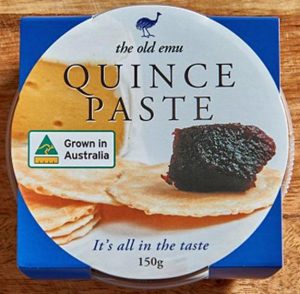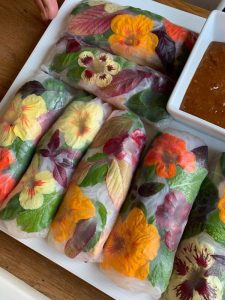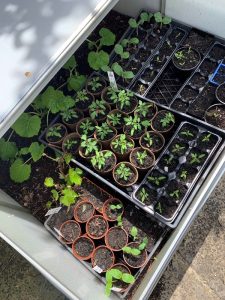Thanks to all the people who have contributed to this week’s newsletter: Anna Sanders, Angelo Eliades, Karen Olsen, Lyn Richards, Maria Ciavarella, Megan Goodman, Nancy Mills, Pam Jenkins, Paul Nugent and Terri Nugent.
A local producer of quince paste – The Old Emu
 The Old Emu, from Box Hill North, have been making quince paste for more than 25 years. It is handmade with quince and sugar with no added preservatives. The sweetened quince puree is cooked for several hours turning intense claret like colour as it thickens and sets. The paste retains its freshness and flavour for 2 years or more. It is available in 150g, 250g and kilo tubs and you can buy it online from their website or at Boccaccio Cellars in Balwyn, Marco’s Deli Cafe Foodstore in Blackburn, Olympus Delicatessen in Doncaster East or The Melbourne Deli in Bayswater. Read their Local Food Directory page. Welcome Paul and Terri!
The Old Emu, from Box Hill North, have been making quince paste for more than 25 years. It is handmade with quince and sugar with no added preservatives. The sweetened quince puree is cooked for several hours turning intense claret like colour as it thickens and sets. The paste retains its freshness and flavour for 2 years or more. It is available in 150g, 250g and kilo tubs and you can buy it online from their website or at Boccaccio Cellars in Balwyn, Marco’s Deli Cafe Foodstore in Blackburn, Olympus Delicatessen in Doncaster East or The Melbourne Deli in Bayswater. Read their Local Food Directory page. Welcome Paul and Terri!
What farmers’ markets will be happening this weekend?
On Saturday: Coburg. Not Carlton.
On Sunday: Alphington and Eltham. Not Yarra Valley.
Edible flowers and leaves – a video from Pam
 Pam Jenkins has produced another video about her edible garden, this time focusing on edible flowers and leaves. In this 8 minute video, Pam discusses a number of edible plants that can be eaten as a garden snack, used as a garnish or included as something different in your diet. They include:
Pam Jenkins has produced another video about her edible garden, this time focusing on edible flowers and leaves. In this 8 minute video, Pam discusses a number of edible plants that can be eaten as a garden snack, used as a garnish or included as something different in your diet. They include:
- Primroses: apparently the youngest leaves taste like lettuce.
- Rock samphire: the most popular way of using samphire is as a pickle.
- Calendula: can be used in skin care.
- Canna lilies: the rhizomes are a source of starch
- Dahlias: the tubers and the petals are both edible.
Watch Pam’s video and/or read the accompanying words.
The photo is of some spring rolls that include edible flowers in their filling.
On what wood do particular fruit trees fruit?
When pruning your fruit trees, berries or vines, it is important to understand what wood is going to bear the fruit next year. Two examples, illustrate the point.
First, ‘everbearing’ raspberries bear their best fruit on 1st year canes, so a lot of people cut all their canes down to the ground after harvesting. But standard ‘summer bearing’ raspberries bear their fruit on 2nd year canes so if you cut all their canes down to the ground after harvesting then you would get no raspberries the following year!
Second, grapes bear their fruit on current year growth. So, once a part of the vine has fruited, it will never fruit again. So, their annual prune typically comprises cutting off just about all of last year’s growth. Peaches, on the other hand, bear their fruit on last year’s growth (so-called 1-year-old wood) so if you pruned them like you prune grapes, you would get no peaches the following year!
What causes me to mention all this is that newsletter reader Angelo Eliades has just published a new article entitled ‘What age wood do fruit trees flower and fruit on?’, which lists various fruit trees and which wood they fruit on.
Our website also has a page with similar information – see the right hand column of the table. That table also contains information for each fruit tree about its range of fruiting months, whether or not 2 or more are needed for pollination and whether or not the fruit will ripen after being picked.
Yes, you did know – making firm yoghurt
Last week, Susan Faine asked how to make firm yoghurt from low fat milk without adding milk powder or gelatine. Maria Ciavarella has replied: “I strain my yoghurt through a very fine mesh to make it thicker. You can use the whey left over in cooking too.”
Yes, you did know – broad bean recipes
Lyn Richards has an addendum to last week’s broad bean recipes: “Freeze them. Broad beans are one of the best home gardener freezing options. Freeze straight from picking – remove the beans from their outer pods, but don’t cook or slip their skins; rather, just wash, drain, pack and freeze for an all-year supply for all recipes. When taken out, don’t thaw – just drop the frozen beans straight into boiling water, boil till thawed and proceed as usual to slip their skins.”
Coffee cups, lids and compostability – some reactions
A number of people have written in with some reactions to Lucinda Flynn’s article on coffee cups, lids and compostability.
Anna Sanders and Karen Olsen both make the point that the answer to disposable coffee cups is BYO.
Anna goes on to discuss waste more generally: “We need a much better understanding of the compostability of waste, what can and cannot be recycled, and what happens to the household waste that we generate. The better people understand this, the better choices they might make. It seems to me that people are still confused as to what needs to go in the red bin, the recycling bin and the green waste bin. There needs to be more education on this and clearer rules along with people understanding the impact of contaminating their green waste or recycling. It would be great if Councils were firmer and refused to collect bins if they were contaminated. Giving people visibility of what happens to their recycling after it is collected or, better still, what happens to their green waste, might also be helpful: imagine if we all had to spend a day down at the facility where they separate the plastic bags, dog waste and other contaminants from the green waste before it can be composted! Finally, newsletter readers might be interested to know that there is a ‘Spring Clean Your Patch’ initiative on 18th October to collect rubbish and raise awareness about waste and the issues of single use plastics.”
Whilst Karen goes on to discuss her experience with ‘compostable’ bin liners: “I have recently trialled ‘compostable’ bin liners from the supermarket to line our compost bin. I understand that these liners may eventually break down, but I have found the result to be lovely homemade (cool) compost mixed with revolting clumps of bags throughout – i.e. the bags look like they might eventually break down, but nowhere near at the rate of the other compost ingredients. I have been sorting them to one side when barrowing the compost around our fruit trees. It’s a pain, and I get concerned that the birds scrabbling around in them might be at risk of choking when they forage through it or take back possibly-less-than-foodsafe or nature-safe remnants to build nests. I imagine a hot compost system, or maybe wetting it before it gets into the compost, might be more effective. Anyone else got any experience with these bags?”
Nancy Mills, who was the person who asked the original question that led to Lucinda’s article, has also responded: “Great article by Lucinda! Australians throw away an estimated 1 billion disposable coffee cups every year. Newsletter readers might like to ask their favourite local cafes what they know about the disposable coffee cups that they use. Or perhaps they could ask their local councils if they collect compostable cups for delivery to industrial composters.”
The 2020 Eltham Annual Wine Show
The 2020 Eltham Annual Wine Show will be a virtual event this year but they will still be judging wines and making awards. You don’t need to be a member to enter your wine into the competition. As well as the traditional categories of grape wines, country wines, mead, etc, they are introducing two new categories this year: cider and kombucha. Entries will be judged on palate, bouquet (aka nose) and colour (aka appearance). Closing date for completed entry forms: 24th October. Closing date for receipt of bottles: 13th November. Read more and potentially complete the entry form.
Some new articles by Angelo Eliades
How to improve drainage in plant pots, the proper way to do it!. This article is effectively a continuation of a previous Angelo article where he argued that you shouldn’t put a layer of rocks in the bottom of a pot.
The easiest way to dry and process turmeric root to make turmeric powder.
Read more of Angelo’s food-related articles.
Not local but interesting
The UN’s World Food Programme has been awarded the 2020 Nobel Peace Prize. You can participate in this programme by making small donations on your phone – just download the app.
Meg’s social isolation week
 Isolation is starting to make me weary so I am so grateful to see my little cold frame bursting at the seams (see photo). With the cooler weather this week, I am lucky to have it. The seedlings are still small and will need to grow on a bit more before planting out. I will feed them with a seaweed-based fertiliser twice weekly for a week or two.
Isolation is starting to make me weary so I am so grateful to see my little cold frame bursting at the seams (see photo). With the cooler weather this week, I am lucky to have it. The seedlings are still small and will need to grow on a bit more before planting out. I will feed them with a seaweed-based fertiliser twice weekly for a week or two.
The French tarragon has emerged from winter dormancy and is lovely and fragrant. Thyme, oregano and marjoram and all doing well after their winter haircuts and the flat leaf (Italian) parsley has self-seeded and has lovely fresh growth. I am using lots of herbs at the moment in baking, including for cheese puffs (see recipe below). These are similar to a light savoury muffin. School lunches are not something I have had to think about for a while but these will do.
Cheese and herb ‘puffs’
½ cup plain flour
1½ teaspoons baking powder
1 egg beaten with a tablespoon of milk (may need a little more)
1 cup of cheese, grated
½ cup of mixed fresh herbs (such as parsley, chives and thyme), finely chopped
1 teaspoon of salt and sprinkle of pepper
Mix all the dry ingredients and cheese together. Add the egg and mix lightly until you form a rough dough.
Pile up small dessert spoon amounts on a baking tray. Bake in a hot oven (220degC) for 8-10 minutes.
Note that they freeze well.
Joke of the week
 What do you get when you cross a fruit and a dog? Melon collie.
What do you get when you cross a fruit and a dog? Melon collie.
Upcoming online events
If you know of any events other than those listed below, email me.
Newly announced events
Cooking for a crowd (thermomix): Sunday, 18th October, 2-3.30pm; free; organised by Libby Bracchi. Read more and book on EventBrite.
Beginners guide to urban farming: 7 consecutive Sundays starting 1st November, 2-3pm; $77 ($11 per class); organised by Richmond Community Learning Centre. Read more and book on their website.
Declutter your body, create a garden of food in your fridge: Sunday, 1st November, 2-3.30pm; $donation; organised by Cecilia Macaulay. Read more and book on EventBrite.
Previously announced events
Vegan and gluten free Italian cooking class: Saturday, 17th October, 1-2.30pm; $20; organised by Shop225. Read more and book on EventBrite.
Backyard beekeeping basics: Wednesday, 14th October, 7-9pm; $50; organised by CERES. Read more and book on Humanitix.
Chicken biryani: Friday, 16th October, 5-6.30pm; $35; organised by Cook Indian by the Creek. Read more and book via Facebook.
Spring – planting and bugs: Wednesday, 21st October, 11am-midday; $17; organised by Heide Museum of Modern Art. Read more and book on EventBrite.
Aloo gobi and chapati flatbread: Saturday, 24th October, 5-6.30pm; $35; organised by Cook Indian by the Creek. Read more and book via Facebook.
Under the covers of Mirka & Georges – a culinary affair: Thursday, 29th October, 3-4pm; $17; organised by Heide Museum of Modern Art. Read more and book on EventBrite.
Growing fruit and veg in a wildlife garden: Thursday, 29th October, 7-8.30pm; free; organised by Sustainable Gardening Australia. Read more and book on WeTeachMe.
Butter chicken: Friday, 30th October, 5-6.30pm; $29; organised by Cook Indian by the Creek. Read more and book via Facebook.
Sourdough bread making: Saturday, 31st October, 11am-midday; $20; organised by Living & Learning Nillumbik. Read more and book on their website.
Sourdough bread making: Sunday, 1st November, 3-4pm; $20; organised by Living & Learning Nillumbik. Read more and book on their website.
Getting started with veggie gardening: Thursday, 5th November, 7-8.30pm; free; organised by Sustainable Gardening Australia. Read more and book on WeTeachMe.
Rising resilience – the power of sourdough: Saturday, 7th November, 10.30am-12.30pm; free; organised by Transition Banyule and others. Read more and book on TryBooking.
Home composting Q&A: Monday, 9th November, 7-8.30pm; free; organised by Edendale. Read more and book on WeTeachMe.
Bees wax wrap: Wednesday, 11th November, 6.30-7.30pm; free; organised by Whittlesea Council.
Modern bush tucker: Thursday, 12th November, 7-8pm; free; organised by Moreland City Libraries. Read more and book on EventBrite.
Preparing for Summer harvest: Thursday, 12th November, 7-8.30pm; free; organised by Sustainable Gardening Australia. Read more and book on WeTeachMe.
Growing citrus: Saturday, 14th November, 11am-12.30pm; $28; organised by Sustainable Gardening Australia. Read more and book on WeTeachMe.
The art of watering: Sunday, 22nd November, 1.30-3pm; $28; organised by Sustainable Gardening Australia. Read more and book on WeTeachMe.
Open Table offer their weekly no waste cook club workshops free and online on Saturdays, 11.30am-1pm. As well as cooking (which is actually optional), you will learn about food waste and composting. Register on EventBrite.
All The Dirt is a weekly podcast about gardening.
